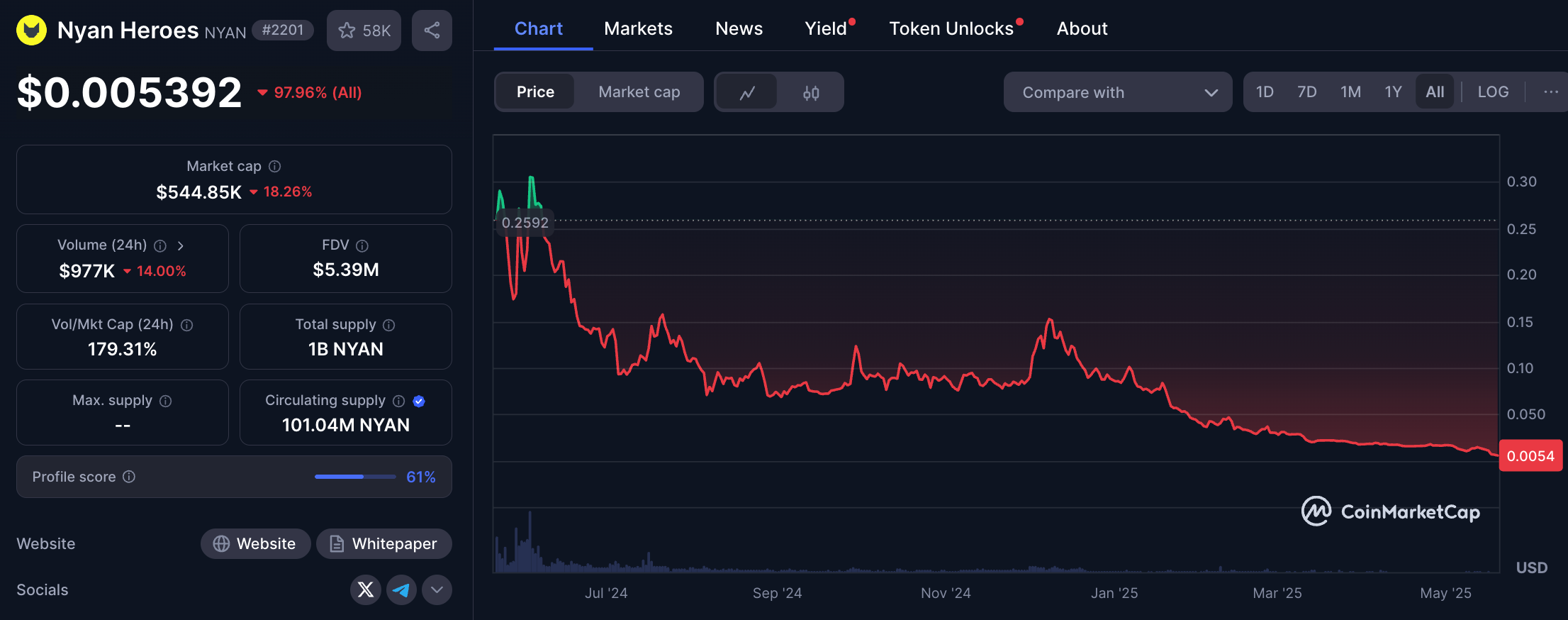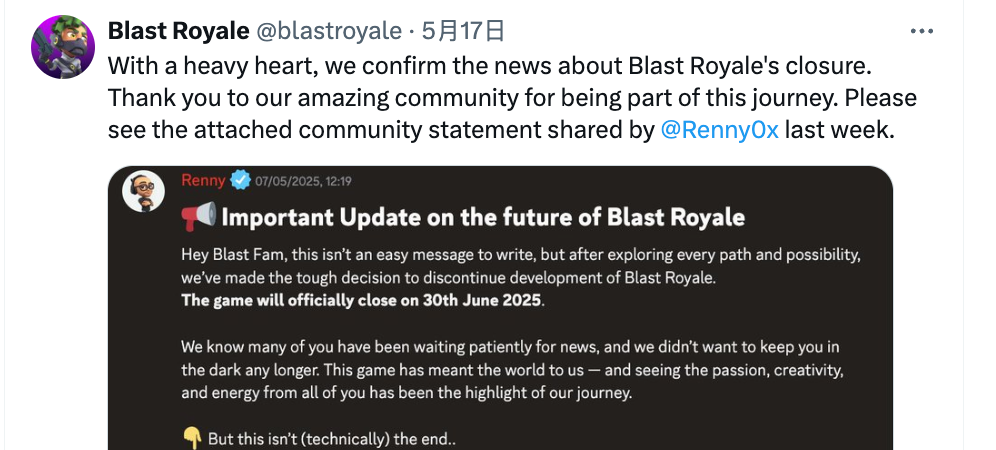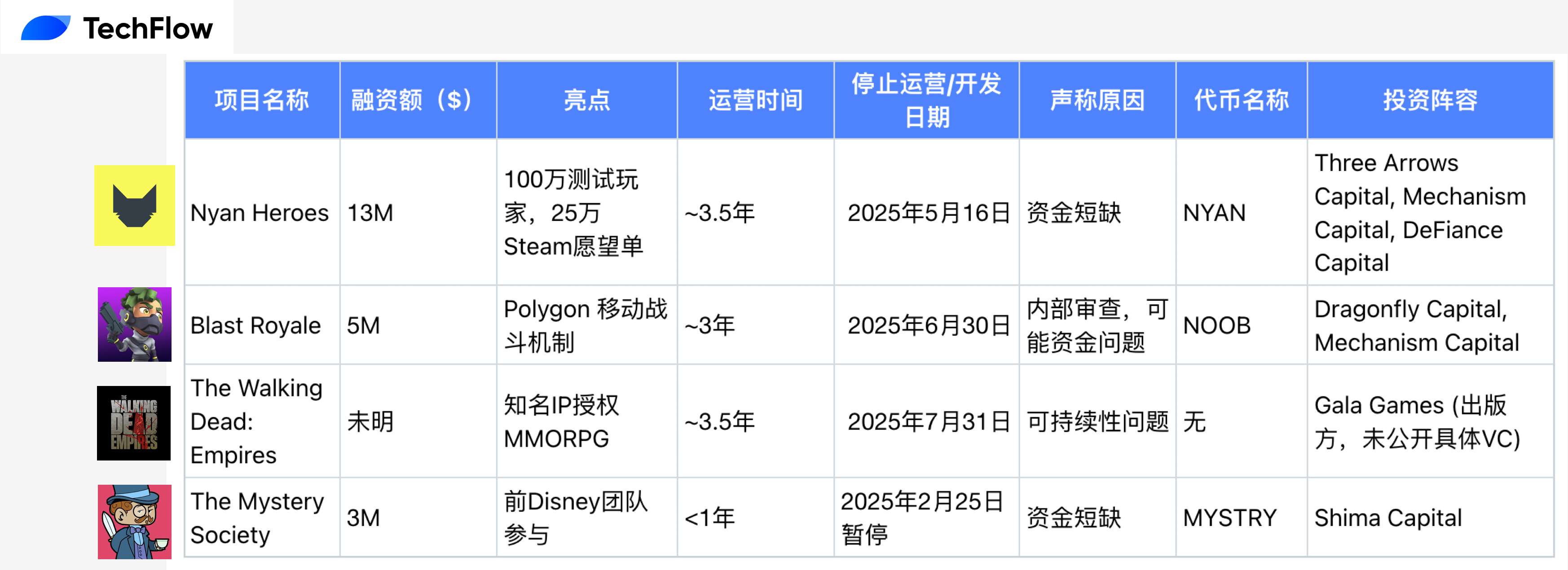当版本之子 Meme Lauchpad 们打得如火如荼时,一些项目正在成为版本弃子。
比如上个周期红极一时的链游项目们,最近迎来了一波停运潮。
5月16日,Solana 生态曾经的明星游戏项目 Nyan Heroes 宣布因“资金短缺”正式停运。开发商9 Lives Interactive在X平台发布声明,坦言“无法获得更多资金完成游戏”。
短短一天内,NYAN 代币跌幅高达 37.2%,随后 FDV 更跌至仅有 5M 左右,较历史高点蒸发近99%。

低谷时有多落寞,顶峰时便有多高光。
回忆一下,这款游戏曾经吸引100万测试玩家、Steam愿望单高达25万;而如今的市值甚至可能不如一个 Meme 土狗。
然而,Nyan Heroes 的倒下并非孤例。近期多个链游项目接连宣布停运或暂停开发,此前的融资额从数百万到千万美元不等,却无一例外走向终结。
加密行业的周期性在链游上体现的淋漓尽致。顺风高融资、先发资产再做产品、逆风逐渐躺平甚至归零......
有社区评论戏言,链游的没落是一场“自然选择”。
盛极而衰的群像
无独有偶,2025年,Blast Royale、The Walking Dead: Empires、The Mystery Society 等多个链游项目接连宣布停运或暂停开发。
这些项目曾都以高额融资和 P2E(Play-to-Earn)模式吸引无数目光,却在短短数年内从盛极一时走向黯然落幕。
Nyan Heroes:猫咪英雄的泡沫破灭
这确实曾是Solana生态的明星项目,凭借猫主题英雄射击游戏的创意,累计融资1300万美元,包括2021年11月的250万美元种子轮、2022年5月的750万美元A轮(估值1亿美元),以及2024年3月的300万美元追加轮。
游戏测试曾吸引了100万玩家(官方数据),Steam 和 Epic Games Store 愿望单高达25万,2024年5月 NYAN 代币上线更推高了市场热情。然而,2025年5月16日,开发商9 Lives Interactive宣布因“无法获得更多资金”停止开发。
Blast Royale:战斗王的黯然退场
Blast Royale是一款基于Polygon的移动战斗王(大逃杀存活)游戏,主打6分钟快节奏对战和P2E机制。2022年4月,项目通过ICO融资500万美元,投资者包括Dragonfly Capital和Mechanism Capital。
游戏以其轻量化玩法吸引了早期玩家,但始终未能实现大规模突破。2025年5月,开发商First Light Games宣布因“内部审查”决定终止开发,计划于6月30日正式停运。

The Walking Dead: Empires:IP光环也不好使
由Ember Entertainment开发,Gala Games出版,基于知名美剧《行尸走肉》IP打造的生存MMORPG,融入NFT所有权机制。
项目虽未公开具体融资额,但依托Gala Games的资金支持和IP优势,开放测试超过一年,吸引了粉丝构建基地和参与战斗。然而,2025年5月,Gala Games宣布因“综合考虑”将于7月31日终止项目。
The Mystery Societ:推理游戏昙花一现
由前Disney和Club Penguin团队打造,主打Web3社交推理玩法,2024年9月获300万美元种子轮融资,Shima Capital领投。项目以社区驱动和创新机制获得好评,吸引了活跃玩家参与早期测试。然而,2025年2月25日,开发商Great Big Beautiful Tomorrow宣布因“行业挑战和资金不足”暂停开发。
我们也做了一个表格,汇总了以上宣布停止运营或者停止开发的链游们。
可以看到,这些游戏基本都是在上个周期融到了还不错的金额,且不约而同的使用了 NFT 和代币资产与游戏中的机制相结合进行消耗的机制。
知名 VC 扎堆投资,却依然难当失败的现实。

| 项目名称 | 融资额($) | 亮点 | 运营时间 | 停止运营/开发日期 | 声称原因 | 代币名称 | 投资阵容 | 宣布停止后代币情况 |
| Nyan Heroes | 13M | 100万测试玩家,25万 Steam愿望单 | ~3.5年 | 2025年5月16日 | 资金短缺 | NYAN | Three Arrows Capital, Mechanism Capital, DeFiance Capital | 当天价格跌约49% |
| Blast Royale | 5M | Polygon 移动战斗机制 | ~3年 | 2025年6月30日 | 内部审查,可能资金问题 | NOOB | Dragonfly Capital, Mechanism Capital | 价格稳定,5月19日$0.0004372 |
| The Walking Dead: Empires | 未明 | 知名IP授权MMORPG | ~3.5年 | 2025年7月31日 | 可持续性问题 | 无 | Gala Games (出版方,未公开具体VC) | 无特定代币 |
| The Mystery Society | 3M | 前Disney团队参与 | 1年 | 2025年2月25日暂停 | 资金短缺 | MYSTRY | Shima Capital | 代币未推出 |
表象之下,玩家流失、P2E模式失衡、资产和开发优先级错位才是真正推手。它们高标榜融资、许下宏大愿景,却鲜有交付可玩产品。
而有些事情也是一种心照不宣的行业默契:产品本身并不是重点,也没有人真的想玩这些游戏。一个拼创意和内容密度的赛道,遇到了拼体力和金钱嗅觉的撸毛客们,结果可想而知。
盛极而衰,盛在融资,衰在玩法。
基因决定命运
你或许已经注意到了,更加讽刺的地方,在于这些链游项目们宣布停运的原因 ---“资金短缺”。
停运的链游项目们,几乎都会官宣自己不干了的原因是资金不足,难以打造出一款高品质的游戏。
这些链游们真的缺钱吗?从纯做游戏的角度说,或许不缺。
比如 Nyan Heros 融资的1300万美金,我们先不论游戏如何,1300万美金是什么概念?
顶级 3A 不说,就拿国产之光,顶级单机游戏 IP 《仙剑奇侠传》的第七代作品来说,据公开报道其开发成本为6700万元。也就是说 Nyan Heros 的融资资金全拿来做游戏,认真干出一个仙剑绰绰有余。

而海外的案例更加惊人。
知名养成游戏《星露谷物语》(Stardew Valley)由单人开发者 Eric Barone 耗时四年、仅投入约5万美元打造,2016年上线后全球销量超3000万份,成为独立游戏传奇。
这游戏的画面,也和某些融资百万以上的游戏项目差不了太多。

这也说明,游戏是非常讲究创意质量和内容密度的产品,1个人,5万美金,靠创意和玩法也能取胜。
再对比链游们纷纷反应“资金不足”暂停开发,对比非常明显 --- 资金任何时候都会不足,尤其是不想把资金用在开发游戏的时候。
链游的基因,已经决定了它不能朝着传统游戏工业高品质和慢工出细活的方向去做游戏;它更像是资源局和资金盘,需要设计合适的运营节奏和投资规则,来满足各种一二级投资者的需要。
先融资,后做事成为了这个赛道的最优解,至于做不做得成,那就是后话了。
再看传统游戏的成功,反而是先做事,后融资。
比如《黑神话:悟空》,2020年仅开发设计了几个场景,通过发布试玩片段以质量惊艳玩家,证明潜力后才获了后续更多的融资。
而《原神》、《鸣潮》等国内二游新势力们,采取的也是分段开发逐步迭代的办法,每一个版本都试图去呈现新的剧情和人物,玩家觉得有沉浸感并且为角色付费后,慢慢去积累资金,开发更多的版本和作品。
这些游戏以内容为核心,剧情、美术、机制占了大头,融资是辅助而非目的。 Web3 和传统游戏几乎是对立的,投机基因贯穿始终:
玩家即投资者,游戏即庞氏——与游戏所需的耐心与匠心水火不容。赛道本身并非无望,但“先融资后游戏”的模式已是死胡同。
链游的盛极而衰,其实是行业基因与用户需求错位的必然结果。资本与概念可以短期催生热度,但无法长期支撑一个真正有生命力的游戏生态。
当越来越多的游戏被证伪,停运潮之后的去伪存真,反而值得期待。
免责声明:本文章仅代表作者个人观点,不代表本平台的立场和观点。本文章仅供信息分享,不构成对任何人的任何投资建议。用户与作者之间的任何争议,与本平台无关。如网页中刊载的文章或图片涉及侵权,请提供相关的权利证明和身份证明发送邮件到support@aicoin.com,本平台相关工作人员将会进行核查。




